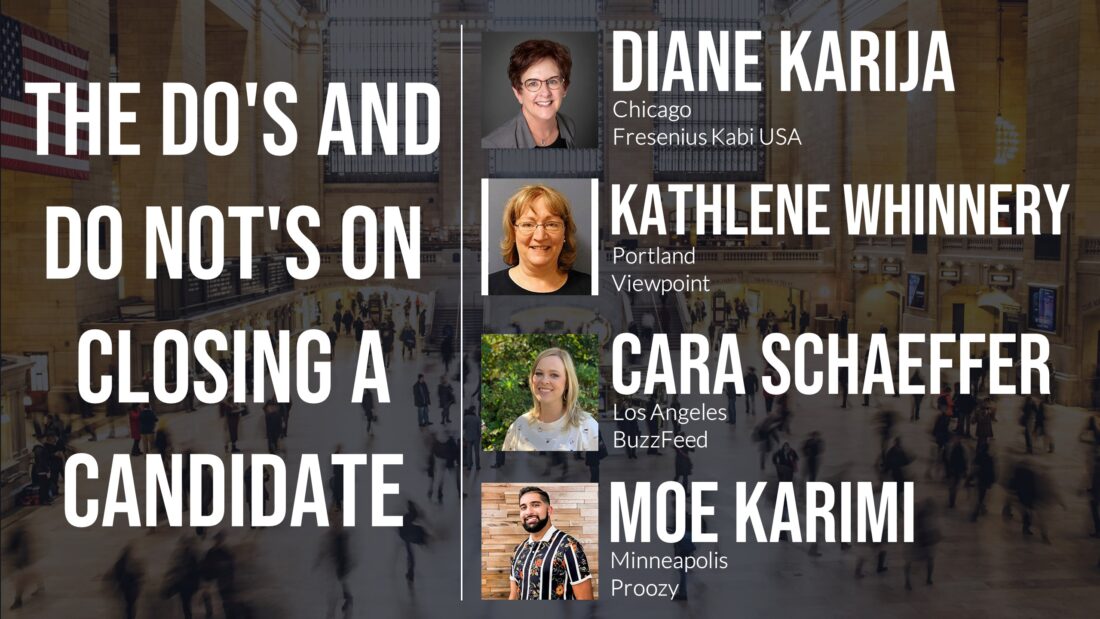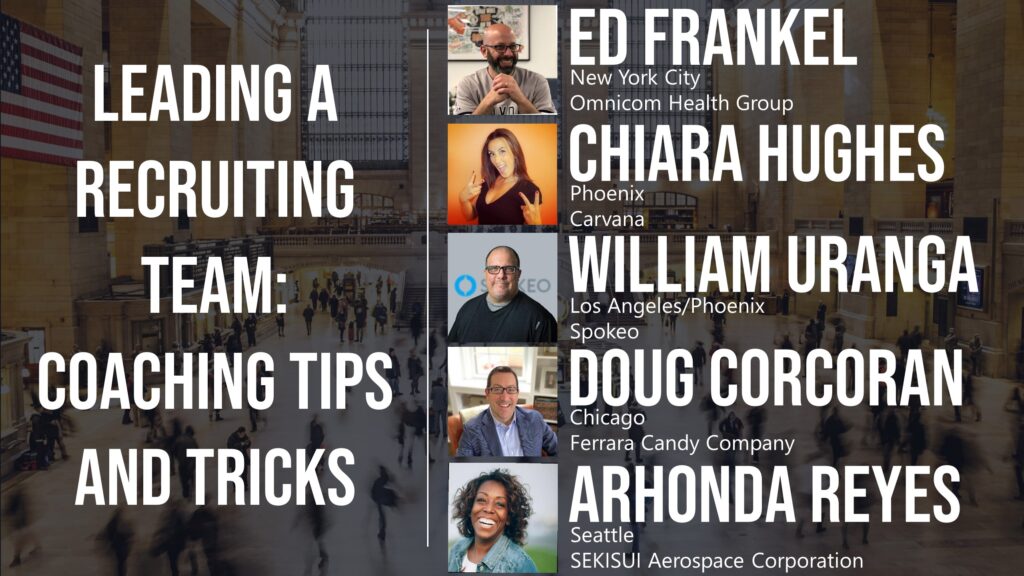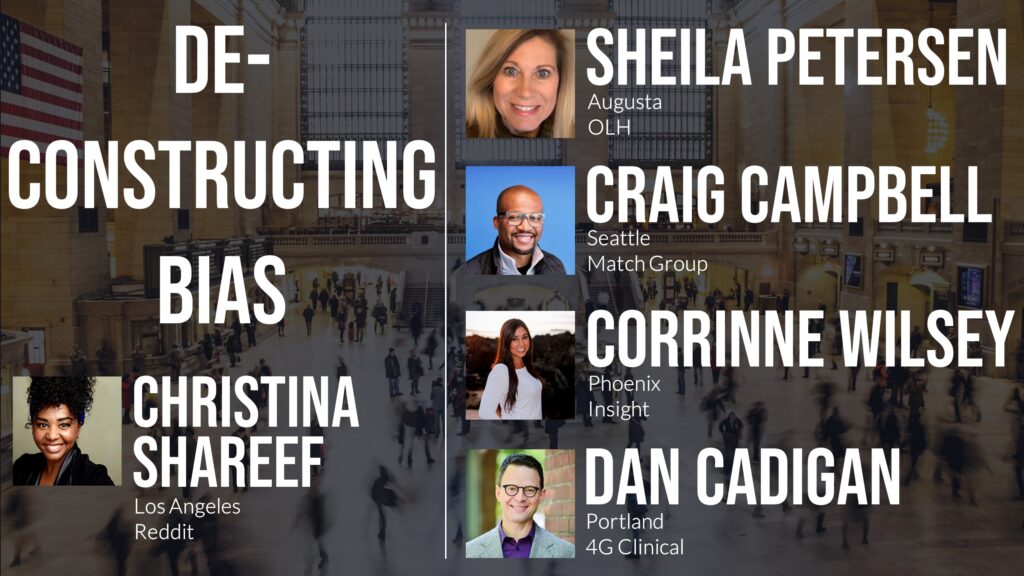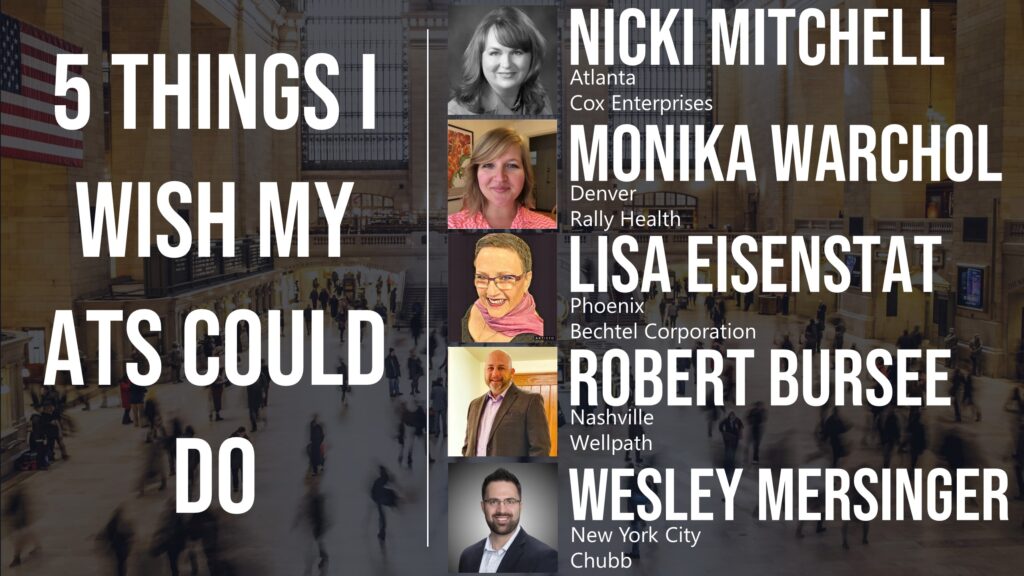The terrible feeling to have as a recruiter is to make it all the way through the recruiting process just to have the candidate not accept the offer from your company.
In this round-table discussion, our panelists talk about best practices to make sure that doesn’t happen.
Listen in on what our panelists have to say.
This event is part of the “Let’s Talk Recruiting” series where a panel of recruiting practitioners get together online and have a conversation on a variety of topics related to corporate recruiting.
Click to Play the Recording
Our Panelists…
| Name & LinkedIn Profile | Group | Title | Company |
We asked our attendees, “What is a tactic that you recommend a recruiter do during the recruiting process to ensure an offer accept?”
Here are their answers:
Chat Messages from the Session…
10:01:39 >> From Kathlene Whinnery to All panelists : Hi everyone!
10:09:18 >> From Katherine Brehmer : Do you play ‘hard ball’ if they don’t want to disclose comp up front ?
10:09:24 >> From Shawn Watzka : When you say upfront do you mean at the end of your initiation conversation, beginning, middle?
10:10:05 >> From Diane Mariuzza to All panelists : I use commute since I recruit for NYC and everyone commutes !
10:10:20 >> From Catherine Hansen : In the SF Bay Area, yes, commute is potentially a selling point
10:10:23 >> From Michelle McKnight : In LA, it’s imperative that I ask that question about commute
10:10:45 >> From Lori Davis : Commute is a big deal in the Dallas, TX area too…
10:10:58 >> From Michelle McKnight : Indeed!!!
10:11:15 >> From Shawn Watzka : I think it plays an important part of the conversation when travel expenses are part of the compensation conversation.
10:14:45 >> From Daniella McDonald : I ask why they are looking to make a change. That gives information to reference later.
10:14:47 >> From Glenn Murani : Very important – in an initial conversation I first find out what the candidate’s background and experience is and the type of role they are seeking – I preface that conversation with I tell the candidate I want to discuss their background first because there could be other opportunities in our organization that could be a better fit. Also, you don’t want the candidate to know about the position too much up front because if the candidate is hard-pressed to get a job that candidate will tell you what you want to hear as opposed to what they are seeking.
10:14:51 >> From Smita Ray to All panelists : It’s not best practice (we are in SF, LA, NY, DC, Denver) to select or disqualify based on their proximity. Instead we ask, about their availability and they can reliably show up to work on time. During the course of conversation, the candidate may naturally reveal information about their commute, but we make sure our hiring criteria is job related and that our interview qs aren’t misconstrued by the candidate should they not be selected.
10:14:55 >> From Annette Rushin to All panelists : I ask “describe your perfect job” and listen for what is important to them
10:16:13 >> From Bez Rengifo : LOL..yes…ABC
10:16:51 >> From Daniella McDonald : And I also ask about other interviews they have, where those are in process, how the jobs and companies compare.
10:17:50 >> From Bez Rengifo : I always asking why they want to leave their current situation and what would they do if they got a counter-offer? But you have to do this up front and always be talking like they received one throughout. That reduces surprises.
10:21:31 >> From Kara Wilson : Candidates are interviewing at so many more companies in this zoom era!
10:22:43 >> From Diane Mariuzza to All panelists : I find that candidates are having issues with connectivity and technology for virtual interviews. We prep candidates with a guide on how to prepare for a virtual interview. We also have a full time person that works with candidates to make sure that they are up in running before the interview (just in case the technology is not working)
10:23:29 >> From Connie Hoffman to All panelists : I think people are researching more since they aren’t going on-site
10:24:22 >> From Annette Rushin to All panelists : I think they are more committed, video interview can be a little intimidating since outside of the norm. Those who embrace this technology have proven to be good hires . On the flip side, interviewing is quicker which makes the landscape more competitive and their shelf life is not long
10:25:00 >> From Glenn Murani : when there is a delay in hring a candidate – we make sure we have several different touch points – and it’s not just the recruiter reaching out to the candidate – it is the hiring manager and maybe another member of the team too – give the candidate that feeling that they are valued by your firm.
10:25:22 >> From Annette Rushin to All panelists : yes!
10:25:35 >> From Annette Rushin to All panelists : not without warning tho
10:25:51 >> From Maureen Daly to All panelists : Hello, we have reached out texting but not facetime
10:26:11 >> From Katherine Brehmer : Answering Shawn: Upfront conversation meaning the initial call when you need to establish if they fall within budget. We hire in niche areas so we don’t often have a big pool of folks available and they are often expensive. They sometimes don’t want to ‘show their hand’ in comp up front but rather want to have that conversation after initial interviews which would often times waste the business’ time since they are too expensive.
10:26:36 >> From Connie Hoffman to All panelists : We utilize zoom to ensure the candidate testing/interviewing is who we are actually hiring 🙂
10:26:52 >> From Shawn Watzka : I have and it is great!
10:26:52 >> From Maureen Daly to All panelists : Yes agree on the texting- much quicker response
10:27:04 >> From Shawn Watzka : referring to text messaging.
10:27:06 >> From William Miller to All panelists : I have both agency and corporate experience. I was taught to have the candidate call me immediately after the interview, especially during my agency days. In my current corporate setting I do have managers that call me before the candidate has a chance to call. This usually means the interview goes well. We use Dialpad. I love the texting option.
10:27:41 >> From Jason Coffey to All panelists : We use TextRecruit and is integrated with iCIMS
10:28:16 >> From Catherine Hansen : I ask my hiring managers to do closing calls, esp important for PM and Engineers who have lots of opportunities.
10:30:25 >> From Catherine Hansen : @Cara, totally agree. Most are looking to learn/grow as motivators for new roles. I think this is a great selling point
10:31:56 >> From Dan Baker : @Cara, aren’t most companies “selling” the opportunity and why their company would be an incredible career move? I’d assume Netflix probably has a pretty solid sales pitch if a candidate is choosing between the two as well.
10:32:40 >> From Glenn Murani : Cara – great point – I like when candidates tell me they are excited about growth opportunities and the money will come (down the road) as they grow and elevate in the firm.
10:33:54 >> From Annette Rushin to All panelists : I have jobs that need to be in the office (i.e. government highly cleared), makes it difficult in this environment
10:35:45 >> From Catherine Hansen : @Panel, curious……if high % of your candidates were declining at offer, what learnings would you glean from this and what would you escalate to management? Ex: comp bands way off, etc
10:36:06 >> From Glenn Murani : for those of you that are in the agency business – I always sell our company to the candidate – not just the current job at hand because I want to give the candidate the feeling we are looking out for them beyond that first engagement – as opposed to a one and done contract with a particular staffing company. Our company culture still comes into the picture here.
10:38:37 >> From Lia Kosmicki to All panelists : Today I asked my candidate what offer he would run to and what offer he would walk to.
10:38:37 >> From Lori Davis : Can Moe repeat those 3 ques about offer acceptance?
10:39:04 >> From Cara Schaeffer : I love that Lia!
10:39:27 >> From Lori Davis : Thank you so much! Great questions!
10:39:42 >> From Annette Rushin to All panelists : I push the entire comp package too (benefits, etc.)
10:41:16 >> From Dan Baker : Yes, agreed! I ask that on that in a different way on the front end when I ask about their compensation expectation range. The bottom number they’d be looking for, a comfortable number that would make them happy and a salary that would knock their socks off.
10:41:38 >> From Dan Baker : Sean really wants to FaceTime…
10:42:17 >> From Catherine Hansen : Agree re camera, but I do ask candidates if they’re ok to meet via camera with a stranger 🙂
10:42:26 >> From Catherine Hansen : (Some don’t like to)
10:42:43 >> From Vira Garcia to All panelists : Moe’s questions were 1) What salary would you be willing to accept? 2)What salary would you have to think about? and 3)What salary would you decline?
10:44:18 >> From Micheal Lowe : @Moe that is great! understanding where someone is at in the process is critical to build that relationship! plus if you think someone is a top candidate, understanding where they are can help you push a hiring team for a faster process, if its necessary. Transparency is key on both part!
10:44:40 >> From Moe Karimi : Thank you Michael!
10:45:04 >> From Vira Garcia : Moe’s questions were 1) What salary would you be willing to accept? 2)What salary would you have to think about? and 3)What salary would you decline?
10:45:21 >> From Catherine Hansen : Engineering hiring managers would likely say yes
10:47:29 >> From Annette Rushin to All panelists : I hear you, it issuch a hit when they say no
10:47:48 >> From William Miller to All panelists : It really depends on the role, the urgency of the need and the conversation I had with the manager at the time of the offer turndown.
10:48:14 >> From Catherine Hansen : Have only heard of this at AMZN
10:48:17 >> From Helen Tunea to All panelists : no I haven’t ever heard of that
10:48:38 >> From Shawn Watzka : When I worked for a Hospital recruiting physicians we would have the Ex Med Director close the deal with the Physcian.
10:49:14 >> From Lori Davis : Great panel and great topic! Thank you all!
10:49:27 >> From William Miller to All panelists : I’ve always been a full live cycle recruiter. I have been in a setting where we had a research assistant who identified candidates and did some of the initial sourcing.
10:49:42 >> From Catherine Hansen : @Cara, yes!
10:49:51 >> From Annette Rushin to All panelists : do not hesitate to circle back to those who decided to stay with current employer, they will be looking again within 3 months
10:50:21 >> From Bez Rengifo : Yes, great topic and one I love 🙂
10:50:29 >> From Glenn Murani : Yes great topic and panel. Just think of all the time you invest in a candidate – and in the end the candidate does not accept your position.
10:50:35 >> From Michelle McKnight : Thanks for another good session! Sean, you should schedule these for an hour; there’s always a lot to cover!
10:51:15 >> From Annette Rushin to All panelists : Thank you, great topic and discussion!
10:52:43 >> From Michelle McKnight to All panelists : Agreed, Michelle! Thanks Sean and everyone for another great session.
10:52:48 >> From Maureen Daly to All panelists : Thanks everyone for sharing – have a great day all.
Some of the attendees…
| Name & LinkedIn Profile | Group | Title | Company |



